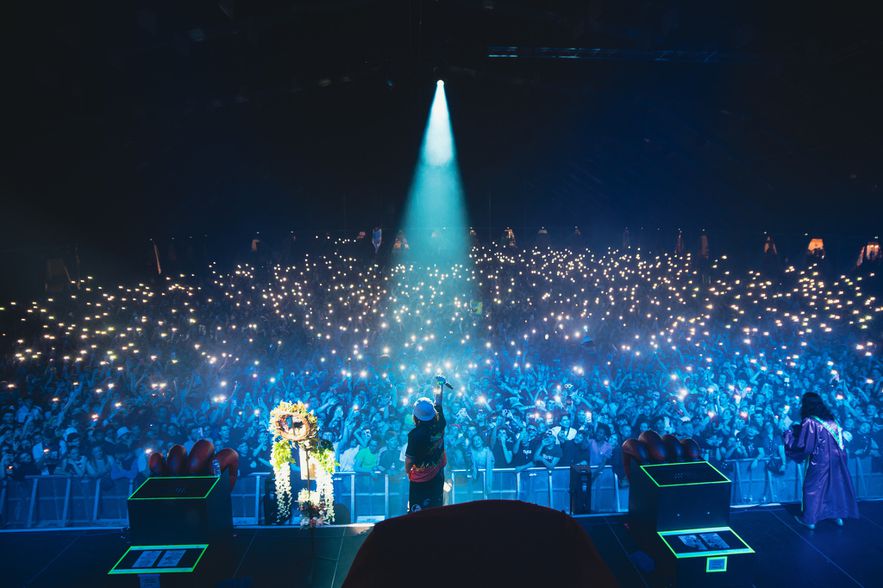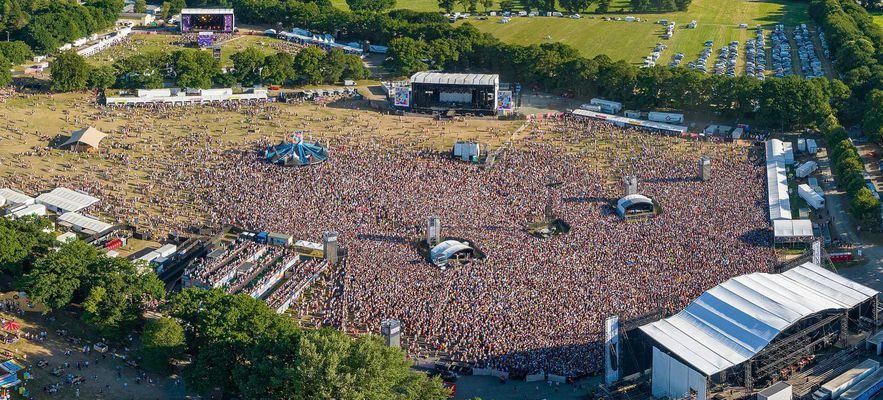The choreography is now well established. Every beginning of June, since 2016, the We Love Green teams have taken over the ten hectares of the Polygone Playground, in the Bois de Vincennes, a few hundred meters from the castle of the same name. A green space, surrounded by trees, which saw, for the 2023 edition, six stages – including one devoted to conferences – set up to host the performances of French and foreign artists. If music remains the center of this festival, which made its debut in the year of its creation in 2011, in the Parc de Bagatelle, near the Bois de Boulogne, it is above all the protection of the environment and the sustainable development that We Love Green tries to defend through its offer and its actions.
Biofuel generators, solar energy, reusable and returnable cups… From the start, this event has sought to inject new momentum. “It’s a prototype. It costs one and a half times more than a classic festival. But our goal is to ensure that all other events adopt our practices”, explains entrepreneur Emmanuel de Buretel, co-founder of the expression.
While it had gathered 11,000 spectators for the first edition, the festival now attracts nearly 100,000 people over three days. “The biggest challenge for us was to keep the same requirement as we grew up, while being compatible with our economic model”, recognizes the other co-founder, Marie Sabot. Especially since being responsible also means promoting the inclusion of people with disabilities. “Accessibility means protecting festival-goers, and especially those with disabilities. We train all volunteers so that they can guide people who wish to the info point and on all platforms, as well as to conferences”, explains Marie Sabot.
Soprano in sign language
The example of We Love Green is not unique in France. Over the past fifteen years, festivals have put their foot on the accelerator to better take into account issues related to the environment and improve the care of people with disabilities. For Alexandra Bobes, director of France Festivals, a network which brings together 7,300 members, the events have integrated these subjects well: “There are pioneering festivals which have been working on these issues for a long time. But everywhere, there are advances, it is just the beginning. It takes support and the desire is also political”.
On the question of accessibility, Malakoff Médéric tries to move the lines. The group specializing in social protection is currently supporting eighteen festivals, including We Love Green, Les Solidays and Rock en Seine, in setting up a real strategy in this area. “It is becoming essential, as are environmental issues and actors are getting more and more involved. There is no competition between festivals on this subject”, according to Pascal Andrieux, director of the Malakoff Foundation. Humanis handicap, which sees the organizers sharing their best practices.
The tens of thousands of Vieilles Charues festival-goers in 2022.
© / Old Plows
Thanks to the financial and technical assistance of this patron, Les Vieilles Charrues reached a milestone five years ago. “We have been able to include all types of disability in our field of action. Today, we have a dedicated ticket office and a team of more than 100 people who are familiar with the issue”, underlines Quentin Sibéril, responsible for sustainable development. for this event created in 1992 and which this year should bring together more than 300,000 people over five days in Finistère. And this 2023 edition will give rise to a first: the concert of the singer Soprano will be translated live into sign language by the collective “10 Doigts en cavale”. “They will be integrated into the show with broadcast on giant screens. This kind of project requires enormous preparation time. One hour of concert requires 300 hours of rehearsal to learn the words and transcribe them”, adds Quentin Sibéril.
The Covid-19 acted as an accelerator
For some festivals, the difficult period of Covid-19 has made it possible to set foot in the stirrup. This is the case of the Francofolies de la Rochelle, which in 2021 obtained ISO 20121 certification, an international standard devoted to sustainable development in events, as did the Printemps de Bourges. “We were already doing a lot of things. Obviously, we knew that it was going to become a major challenge. We said to ourselves that we had to frame our project and materialize it with this certification. The Covid slowed us down in the organization of the festival, that led us to have more regular meetings”, recalls Antoine Darnère, in charge of ISO 20121 certification within Franco. “This label is interesting because we are constantly learning. It is quite intuitive: it is a responsible management technique. This makes it a cross-cutting subject for all teams”, adds Boris Vedel , director of Printemps de Bourges.

The 2023 edition of Printemps de Bourges took place in April.
© / Spring of Bourges
Les Trans Musicales de Rennes is the first festival to have obtained this certification. A long journey that began in 2005, when the event left a small hall in the city center to take up residence in the exhibition center of the most populated municipality in Brittany. Its attendance then increased sharply to now reach 30,000 people every winter. The organizers then set up shuttles to considerably reduce the flow of cars. “When the site changed, we had to find alternative solutions. Our sustainable development model was designed to develop the project”, says Erwan Gouadec, delegate director of the festival which will experience its 45th edition next December.
The movements of festival-goers in the viewfinder
Because for any event, the main problem remains the emissions related to the movements of the spectators. At the Festival d’Avignon, the majority of the public travels by train to reach the city. “The difficulty is the remaining third corresponding to the local basin. There is a great lack of alternative proposals. We encourage carpooling and we remind all the soft mobility plans”, explains Eve Lombart, administrator of the Festival d’Avignon. Unable to act completely on this item, the organizers are transforming their own fleet: since 2020, all permanent vehicles have gone from diesel to all-electric or hybrid. But here again, an obstacle stands up: “On our summer rentals, it is difficult to find electric vehicles. For utilities, there is no offer. So we reserve utilities for moving equipment, says Eve Lombart. In addition, we have 300 technical intermittents. For the many individual trips, we have imposed the bicycle. This conversion is being done little by little. We only ask them for a deposit.”
For other festivals, smaller actions are also welcome. The Aix-en-Provence Festival, a specialist in opera and classical music, has been committed for ten years to an environmental policy on research and the eco-design of sets. “The idea is that, from the production of the decor, we work on its entire life cycle. We are already thinking about how it will be destroyed. The objective being that it can be recycled or reused either at home, or for other decorations”, illustrates its managing director Stephanie Deporcq. To develop its model, the festival calls on its collaborators who have produced a list of 80 proposals in areas as varied as the issue of energy, waste reduction and food. “The idea is to redo a seminar in the fall to assess the feasibility of these proposals. We want to come up with an action plan by the end of the year with a clear roadmap and resources.”
In the meantime, the balance of power between festival-goers and organizers seems to have reversed. “Festivals were rather leaders in the beginning on the environmental issue. Now it is the festival-goers who are in demand, they judge us and question us about the actions we are taking”, observes Boris Vedel of Printemps de Bourges. This is thus creating a new dynamic which could however be dampened by the rise in energy costs and inflation. “I fear that this subject will take a back seat, with the deficits of last year and those which are coming this year. due to the economic crises, not to mention the increase in artists’ fees, accommodation and transport costs”, confides Alexandra Bobes of France Festivals. And to act, many parameters will have to be taken into account. “Festivals are laboratories of new uses, but they do not have all the keys in hand, believes Boris Vedel. They depend on their administrative environment and won’t be able to do anything if they don’t have a strong state and communities that invest in the issue”.
